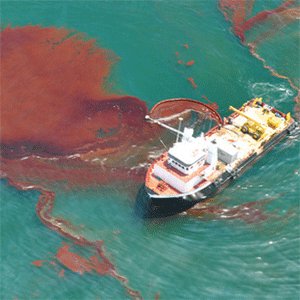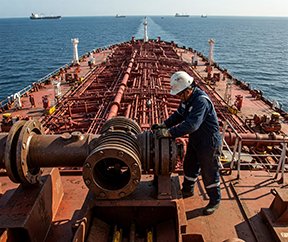Published: August 27, 2015 | Updated: September 19, 2025
Published: August 27, 2015 | Updated: September 19, 2025
The Proactive Approach: Leveraging CMMS for Oil Spill Prevention and Effective Cleanup
 The image of a major oil tanker disaster often dominates the public perception of oil spills. While these catastrophic events rightly garner significant attention, a less publicized reality exists within various industries. Many facility managers grapple with the potential for oil spills stemming from daily operations, equipment malfunctions, and storage issues. They should consider leveraging a CMMS for oil spill prevention and effective cleanup.
The image of a major oil tanker disaster often dominates the public perception of oil spills. While these catastrophic events rightly garner significant attention, a less publicized reality exists within various industries. Many facility managers grapple with the potential for oil spills stemming from daily operations, equipment malfunctions, and storage issues. They should consider leveraging a CMMS for oil spill prevention and effective cleanup.
Any spillage, even if smaller in scale than an Exxon Valdez, still poses considerable risks. They signal underlying problems, demand immediate cleanup efforts, and can escalate into significant environmental hazards, threatening local ecosystems and even nearby communities. Therefore, a proactive stance on oil spill prevention is not just an environmental responsibility; it's a crucial aspect of sound business management.
The Multifaceted Causes of Oil Spills in Industrial Settings
Oil spills originate from a range of sources within industrial environments. Equipment failure stands as a primary culprit. Aging machinery, inadequate maintenance, and undetected wear and tear can lead to leaks and ruptures in pipes, storage tanks, and processing units.
Human error also contributes significantly. Lack of proper training, carelessness during handling procedures, and insufficient adherence to safety protocols can all trigger spill incidents. External factors such as severe weather events, including hurricanes and floods, present unavoidable risks to oil storage and transportation infrastructure. In more extreme and thankfully less frequent cases, intentional acts like vandalism, theft from pipelines, or illegal disposal of crude oil contribute to the problem.
The Far-Reaching Consequences of Oil Contamination
Regardless of their origin, oil spills inflict substantial damage.
- The immediate environmental impact on aquatic life and marine mammals within the affected zone proves devastating.
- As the spill spreads, its reach extends.
- Harm to plant life.
- Coastline contamination.
- Soil pollution.
- Groundwater source infiltration.
- The economic repercussions for businesses can also be severe.
- Hefty fines from regulatory bodies.
- Exorbitant cleanup expenses.
- Long-term damage to reputation and public trust.
Beyond the financial burden, the ethical imperative to protect the environment underscores the critical need for effective prevention and response strategies.
The Power of Proactive Measures: Preventing Spills Before They Happen
While efficient and effective cleanup procedures are essential, the most effective approach to managing the risk of oil spills lies in proactive prevention. Facility managers employ various strategies to minimize the likelihood of such incidents. Comprehensive training and education programs for all personnel who handle oil or work near oil-related equipment form a cornerstone of prevention efforts. These programs instill best practices, emphasize safety protocols, and cultivate a culture of vigilance. Regular drills and simulations further prepare teams to respond effectively in the event of an actual spill.
 CMMS: A Central Tool for Oil Spill Prevention
CMMS: A Central Tool for Oil Spill Prevention
A Computerized Maintenance Management System (CMMS) emerges as a powerful tool in a facility's arsenal for preventing oil spills. This software solution centralizes maintenance data, schedules preventative maintenance tasks, and tracks asset performance. By diligently utilizing a CMMS, organizations significantly reduce the risk of equipment failures that can lead to oil leaks and spills.
Scheduled Maintenance and Inspections
A CMMS enables the creation and management of a rigorous preventative maintenance schedule. This includes routine inspections of pipelines, storage tanks, pumps, and other critical equipment. The system helps managers create, schedule, and dispatch work orders for these tasks. Maintenance technicians can use the CMMS to record inspection findings, document any signs of wear or potential failure, and initiate corrective actions before a minor issue escalates into a major leak or rupture. This proactive approach identifies and addresses potential problems early, significantly lowering the chances of an oil spill due to equipment malfunction.
Asset History and Performance Monitoring
The CMMS maintains a detailed history of each asset, including past maintenance activities, repairs, and performance data. Analyzing this information allows facility managers to identify equipment that experiences frequent failures or exhibits declining performance. This insight enables informed decisions regarding equipment repair, refurbishment, or replacement, preventing potential breakdowns that could cause oil spills. The ability to monitor asset performance in real-time or near real-time, through integration with sensors and other systems, provides early warnings of potential issues, allowing for timely intervention.
Inventory Management
for Spill Response
Beyond prevention, a CMMS can also manage the inventory of spill response equipment and materials. The system tracks the location, quantity, and usage patterns of items like absorbent pads, booms, skimmers, and personal protective equipment. This ensures that the necessary resources are readily available in the event of a spill, facilitating a swift and effective initial response.
Regulatory Compliance and Documentation
Maintaining compliance with environmental regulations concerning oil storage and handling is paramount. A CMMS assists in this by providing a centralized platform for documenting maintenance activities, inspections, and any incidents. This comprehensive record-keeping simplifies audits and demonstrates a commitment to environmental responsibility. The system can also document regulatory requirements reducing the risk of penalties associated with non-compliance.
Discover how streamlined maintenance processes can elevate production. Learn more.
CMMS: Facilitating Efficient Oil Spill Cleanup Procedures
Even with the most diligent prevention efforts, the possibility of an oil spill cannot be entirely eliminated. In such unfortunate events, a CMMS plays a vital role in facilitating efficient and effective cleanup procedures. Its capabilities extend beyond simply preventing incidents to aiding in the mitigation of their impact.
Centralized Incident Reporting and Tracking
When a spill occurs, the CMMS provides a centralized system for reporting the incident. Key details such as the location, time, estimated volume, and initial observations can be logged quickly and accurately. The system then tracks the progress of the cleanup efforts, assigning tasks to response teams, documenting the resources deployed, and recording the amount of recovered oil and used materials. This centralized tracking ensures accountability and provides a clear overview of the entire cleanup process.
Resource Allocation and Management
During a cleanup operation, efficient allocation of resources is critical. The CMMS assists in managing personnel, equipment, and materials. It holds records of the availability of trained response teams, the deployment of specialized cleanup equipment, and the consumption of absorbent materials and other supplies. This real-time visibility into resource utilization helps to avoid delays and ensures that the right resources are deployed to the right locations at the right time, accelerating the cleanup process and minimizing environmental damage.
Communication and Collaboration
Effective communication and collaboration among different response teams and stakeholders are essential during an oil spill cleanup. A CMMS can serve as a communication platform, allowing for the sharing of critical information, updates on the cleanup progress, and any emerging challenges. This facilitates better coordination and ensures that all involved parties operate with a unified understanding of the situation and the objectives.
Post-Spill Analysis and Lessons Learned
After the immediate cleanup is complete, the CMMS provides valuable data for post-spill analysis. The detailed records of the incident, the response efforts, and the resources used can be analyzed to identify the root causes of the spill and areas for improvement in prevention and response strategies. This learning process helps to strengthen future prevention measures and refine cleanup protocols, reducing the likelihood and impact of subsequent incidents.
A Commitment to Environmental Stewardship
The integration of a CMMS into a facility's operational framework represents more than just an investment in efficiency; it signifies a commitment to environmental stewardship and responsible business practices. By proactively managing assets, scheduling essential maintenance, and maintaining a state of preparedness for potential incidents, organizations demonstrate their dedication to safeguarding the environment and the communities in which they operate. This commitment fosters trust, enhances reputation, and ultimately contributes to a more sustainable future for all.
FAQs
What is CMMS and how can it help prevent oil spills?
A CMMS centralizes maintenance data, schedules preventative tasks, and monitors equipment to reduce the risk of leaks and spills.
How does proactive maintenance reduce the likelihood of industrial oil spills?
Regular inspections, scheduled maintenance, and early corrective actions prevent equipment failures that could cause spills.
Can MAPCON CMMS assist in oil spill cleanup operations?
Yes, MAPCON CMMS tracks resources, assigns tasks, and provides real-time visibility to streamline cleanup efforts.
Why is asset performance monitoring important in oil spill prevention?
Monitoring asset performance helps identify equipment at risk of failure, allowing timely intervention to prevent leaks.
How does a CMMS support regulatory compliance for oil handling?
It documents maintenance, inspections, and incidents, simplifying audits and demonstrating environmental responsibility.
What role does inventory management play in effective spill response?
A CMMS tracks spill response materials and equipment, ensuring resources are available for quick and effective action.
MAPCON | 800-922-4336
MAPCON CMMS software empowers you to plan and execute PM tasks flawlessly, thanks to its wealth of features and customizable options. Want to see it for yourself? Click the button below to get your FREE 30-day trial of MAPCON!
Try It FREE!